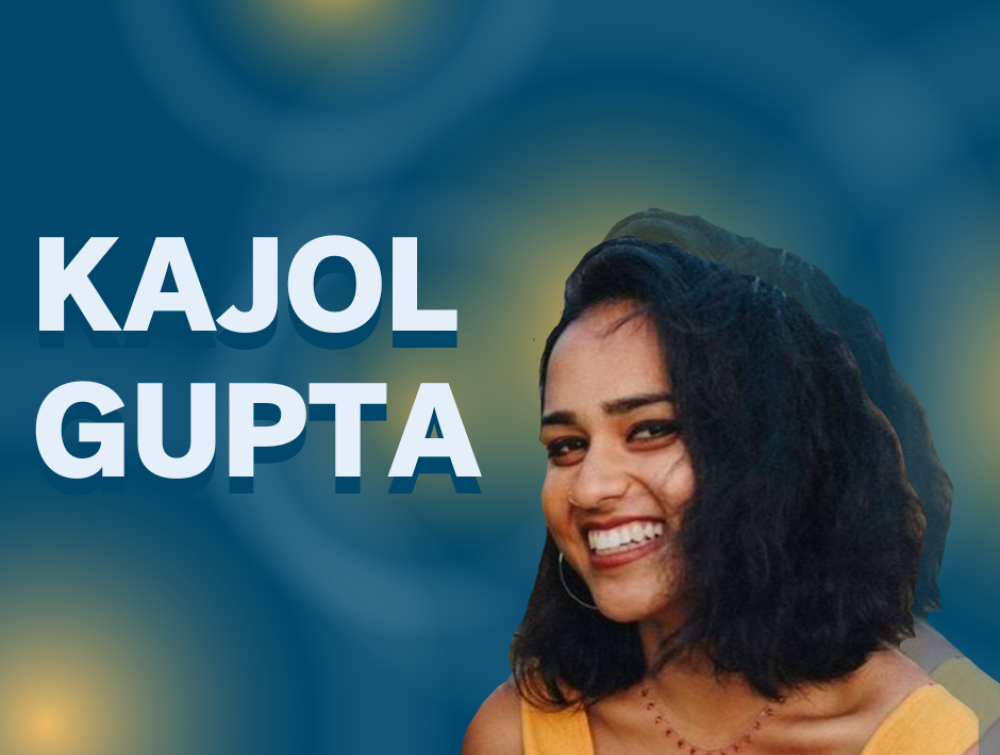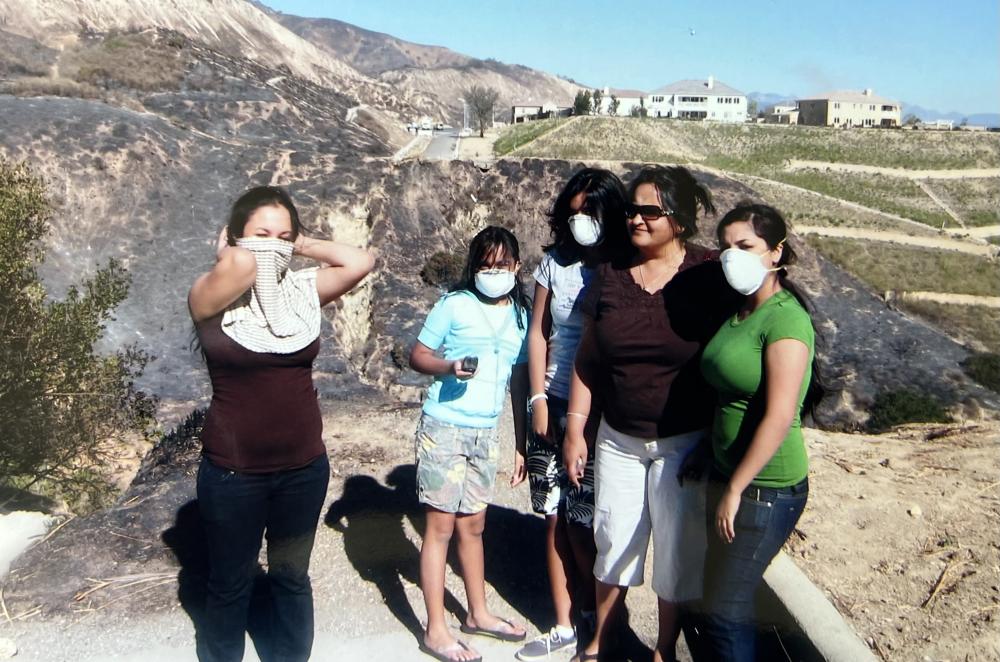“We need everything under the sun”: Scientist hunts for equitable climate solutions

Kajol Gupta smiles while standing next to sunflowers
Scientist’s experiences shaped by observing disaster and inequity
In a way, fossil fuels have played a huge role in shaping Kajol Gupta’s life.
In the fifth grade, Gupta remembers looking out her classroom window and seeing flames from a wildfire jumping the streets toward her school. Her mom quickly came and picked her up and they evacuated to a relative's house for a week.
Once it was safe, Gupta and her family returned to their home in Porter Ranch, just north of Los Angeles. Their house was fortunately still standing, but her neighborhood looked “haunted.” “It was burned to a crisp. It was really eerie,” she remembered. “When you’d walk on a trail, the ash would turn into a cloud and just surround you.”
Porter Ranch was the “perfect” suburban neighborhood to start a family, according to Gupta, who grew up surrounded by immigrant families like her own. But the neighborhood’s chaparral ecosystem, settled against rolling hills and dry bush, has made it increasingly vulnerable to wildfires in a drier and hotter environment due to fossil fuel-driven climate change.
After the fifth grade, Gupta and her family were evacuated two more times due to wildfires—each time fortunate to return and find their home still standing. But they were consumed by anxiety about what might happen in the future. “Just because [the wildfire] didn't necessarily hit our neighborhood the last few times doesn't mean that it won't happen,” she explained.

Kajol Gupta and her family stand outside wearing cloths over their mouths and noses to protect themselves from smoke
Gas leak exposed unequal community resources
The years since have brought more fossil fuel fallout. When Gupta was a senior in high school, the largest methane blowout in U.S. history happened at a nearby gas storage facility. The resulting disaster, known as the Aliso Canyon gas leak, exposed Gupta’s neighborhood to 100,000 tons of methane, ethane and other chemicals over the course of several months.
The gas leak’s effects were subtle at first, but Gupta remembers people around her eventually suffering nosebleeds, migraines and vomiting. And those consequences weren’t distributed equally. “[The gas leak] impacted so many different communities in very disparate ways in ways that were totally inequitable,” she said.
Some families in her community had the money, time and resources to temporarily relocate after the gas leak. Other familes without these resources had to stay and bear the poor air quality for months, Gupta noted.
Inspired to view the world through a different lens
Gupta’s experiences with wildfires and the gas leak inspired her to pursue a degree in conservation and resource studies at the University of California, Berkeley. But she was shocked to find how white the academic environmental spaces felt, leading her to pursue an additional degree in gender and women’s studies. This allowed her to study environmental issues through an interdisciplinary race, gender and power lens, focusing on environmental justice.
Studying environmental justice helped Gupta put a name to something she’d thought about a lot and process prejudice she has experienced throughout life.
“[G]ender studies was so brilliant in the way that it incorporates different disciplines and is very nuanced in how it's able to call out different systemic failures and make sense of it. I saw the world in rainbows,” she said.
“I think it's really common for scientists and folks in the environmental field to look at natural processes and see them as objective,” Gupta said.
“Unfortunately, the world we live in and the systems that we've created are really subjective and not in a ton of people's favor.”
Finding common ground amid extreme drought
Over the past three years, another climate change-fueled extreme informed Gupta’s work—severe drought. Gupta worked as an environmental scientist at the California State Environmental Protection Agency, within rural farming communities in Siskiyou County in northern California.
Water is allocated in California based on a century-old permitting system. It was Gupta’s job to ensure the water that was granted to each applicant fit within their water rights—which wasn’t an easy thing to do during a drought. “It’s really hard when there's a finite amount of a thing and you're in an unprecedented and environmental disaster trying to communicate to folks that there's not enough water,” she explained.
Her own identities sometimes made these communications even more challenging. Gupta often found herself talking to farmers who were older white men and might not know any people like her. “I'm a petite woman of color,” Gupta said. “And when water is your livelihood and someone like me is telling you to restrict it, I could imagine that would be really frustrating to say the least.”
When those differences would come up, Gupta would try to take it as a learning opportunity to understand the fears and the motivations of the people that she was working with.
“I really do personally believe at the end of the day, we all want the same thing. We all just want to exist in peace.”
A sustainable and equitable world starts with creative ideas and diverse perspectives
Gupta admitted that witnessing so much environmental injustice up-close can make it hard hold out hope for a perfectly equitable world. But she is inspired by other people’s ideas about what that world might look like. She recalls a research paper on environmental futurism that explored how Wakanda, a fictional country that appears in the Marvel movies, could be a model for an environmentally sustainable world where people of color are at the forefront.
In the fall, Gupta will begin working toward her master's degree in freshwater and coastal ecosystem management at the Yale School of Environment. She will continue to learn about water as an essential resource that needs creative and equitable management across local communities—and of course, she will keep trying to forge meaningful connections.
“I pride myself in being an interdisciplinary scientist—that means being able to talk to folks and engage, as well as talk about the data,"
"We need interdisciplinary scientists, we need queer scientists, we need women of color scientists. We need everything under the sun as a form of a scientist if we're going to do meaningful work.”
Kajol Gupta's story is part of a collection in “5 Stories: Resistance in the era of fossil fuels and climate change” where we talk to community members organizing, rallying and fighting back against the various stages of the fossil fuel lifecycle, from the point of oil and gas extraction to the climate extremes it creates.
